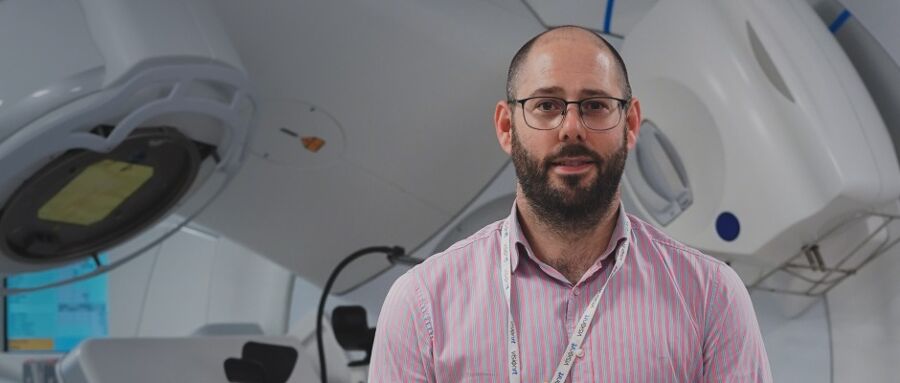
Ben Allen
Radiotherapy BSc (Hons)
University never appealed to Ben, but when he discovered Radiotherapy and the instant skills and experience he could gain from the course, he never looked back. After working his way up in the Radiotherapy department at Birmingham’s Queen Elizabeth Hospital, Ben is now thriving in his role as a Trainee Consultant Breast Radiographer with a bright future ahead.
“I never actually wanted to go to university as I didn't know what I wanted to do. After school, I had a few years of sort of flitting around. At one point, I planned to go into the Royal Navy, and I even did all the entrance exams for it. But eventually, I followed what all my friends were doing and went to university.
I originally chose to study Biology, but I dropped out within a month. It felt like I was doing a degree for the sake of doing a degree. It was whilst I was working as a temp that I came across Radiotherapy. It really appealed to me as it was a degree that trained you to do something. So when you left university, you were instantly equipped to do a job. It was definitely the vocational side of the degree that attracted me to it. It made sense for me to go to BCU, I lived down the road and I didn’t want to move to a totally different area of the country when I could study right on my doorstep.
The way that the course at BCU is structured means that it’s almost 50% academic and 50% actually working in a department. So out of those three university years, half of that time was doing the job at varying levels of knowledge and experience. So when I qualified, I was well equipped to do the job. Of course, there was a jump up from student to staff and a lot more responsibility, but by that point, I was ready to take the challenge on.
Since graduating, I have worked in the same department at the Queen Elizabeth Hospital in Birmingham, but in various roles. After university, the first opportunity I got was a Band Five job, which was rotating around in different areas of the department and getting to know the trade, as well as really learning how to deliver the radiotherapy techniques that we have here in Birmingham. The first promotion after that was to Senior Radiographer and assisting the Team Leader.
Then, I was promoted from that role to a Band Seven, which is the Team Leader role. Within that role, I was treating between 30 and 40 patients a day and was also in charge of those who made up my team. I then got promoted to a Technical Lead Radiographer, which is in Band Eight. This meant that I actually left the treatment floor and instead of treating patients, I had to focus on developing techniques within the department including implementing new technologies as well as taking on management responsibilities like annual leave, schedules and performance reviews. A few months ago, I got another promotion to my current role.
Nowadays, I work as a Trainee Consultant Breast Radiographer. I’ve only been in the role for a few months, so it’s still early days, but at the moment I'm training and shadowing doctors. The Consultant Clinical Oncologists are training me how to do their job in a limited capacity for certain cohorts of patients, so that I can take work off them and do it autonomously, which should improve patient and waiting lists. It will take the pressure off the consultants and it will hopefully improve the patient experience as well. This job also allows me to have more patient focusing responsibilities, which I missed from my previous role.
I've enjoyed every role I've had in my career so far. But I am most proud of my most recent promotion, as I am the first person to have this role within the department. It was a job that had been talked about for a few years, so I tried to line myself up for it nicely. There were elements that I was probably weaker than other candidates at when going into the interview. So to get this job and to be trusted with it as the first one in the department, I had to really prove myself and I’m so proud of being able to do that.
In the future, I’d love to progress to a fully trained and competent Consultant Radiographer and be able to develop the role, expand it to the cohort of patients that I'm able to see in order to benefit more patients and to help the consultants even more.
My advice to current students is to get stuck in once you graduate. If you stay in the department you've trained in, you may always feel like a student. So if you get stuck in and start acting like a Radiographer from day one, then you can get rid of that feeling. If you get involved and start taking responsibility, it will get you off to a flying start.
Also, don't worry about getting promoted too quickly. There are a lot of people who come in wanting to specialise in something very early on. It’s not a bad thing, but you can gain a lot from working on the treatment floor, learning the techniques and how to deliver them, and just by being in the department. The opportunities will come their way when you’re ready for the next step.”